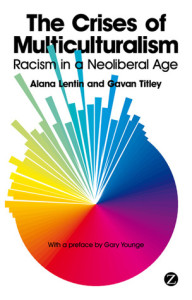Multiculturalism has come under increasing attack in the past two decades. It began with a backlash against affirmative action in the US in the 1990s, and intensified after 9/11 and subsequent terrorist attacks in Europe. Now it’s routine to see multiculturalist excess derided and mocked.
In this book, Alana Lentin and Gavan Titley do a good job of charting the process, and also exposing the true reasons for it. Multiculturalism is a straw man, the authors argue. Despite what you read all the time in outraged newspaper columns, there was never a concerted government policy to promote other cultures or encourage difference.
The current threats, too, are overblown. When the French Parliament voted to ban the burka, only 0.1% of Muslim women wore it. When Switzerland banned the construction of minarets, there were only four in the whole country, and they were already prohibited from issuing a call to prayer. Yet a Swiss MP still warned that minarets could lead to sharia law in Switzerland, with “honour killings, forced marriages, circumcision, wearing the burka, ignoring school rules, and even stoning.”
Attacking multiculturalism is also used as a covert way of expressing racist opinions in societies where overt racism is no longer acceptable in the mainstream. So when Sarkozy attacks the Roma and links rising crime with immigrant “scum”, it’s apparently not racist, but merely a reaction against the politically correct excesses of liberal multiculturalism. Lentin and Titley do a good job of tracing in detail how thin the division is between race and culture, and how racism can often be smuggled in under the guise of legitimate cultural criticism.
This is not to say that they propose complete cultural relativism – it’s not racist to have a problem with stoning or forced marriage – but merely to point out how often cultural issues are used as a cover for underlying racist actions. Progressive causes are often co-opted, too, as the English Defence League presents itself as a champion of gay rights, or Donald Rumsfeld claims to care about the oppression of Afghan women.
Meanwhile, impossible demands are placed on minority cultures within Europe and the US. There’s a chapter on “good and bad diversity”, illustrated with a reference to Ibsen’s play The Doll House, in which a man sees his wife as a doll to be manipulated and treated in a patronising way.
This is supported by a great quote from Gary Younge:
Somewhere out there is the Muslim that the British government seeks. Like all religious people he (the government is more likely to talk about Muslim women than to them) supports gay rights, racial equality, women’s rights, tolerance and parliamentary democracy. He abhors the murder of innocent civilians without exception – unless they are in Palestine, Afghanistan or Iraq. He wants to be treated as a regular British citizen – but not by the police, immigration or airport security. He raises his daughters to be assertive: they can wear whatever they want so long as it’s not a headscarf. He believes in free speech and the right to cause offence but understands that he has neither the right to be offended nor to speak out. Whatever an extremist is, on any given day, he is not it.
Lots of good points, then, but the one downside of this book was the occasionally stultifying language. Take this sentence, for example:
In a prescient passage in Even in Sweden, Allan Pred (2000) poses a series of questions probing the ways in which the uncritical ontological and discursive overlaps between mainstream multiculturalism and its strategic racist appropriation may serve to further produce racialized populations as subjects of problematization and regulation.
The problem for me is not that I don’t understand the words, but that the order in which they are presented makes my eyes glaze over. If I read the sentence a second time I can work out its meaning, but I’m left with a sense of frustration at being forced to do this unnecessary work. I’m happy to use my brain while reading, but prefer to reserve it for understanding complex arguments or making associations and leaps of my own. When I’m forced to use it to grapple with the basic meaning of a sentence, I feel that the writers haven’t really done their job properly. Give me Gary Younge’s style any day.
Nevertheless, for its nuanced, fresh take on a variety of contemporary issues, I’d still recommend reading this book. People who are used to reading academic language will have no problem with it at all. General readers may find their attention wandering in places, as I did, but will still get plenty of interesting ideas from it.





There are 6 comments
Sounds like a very worthwhile book. It does seem to parallel many of my own ideas. It sounds balanced as it rightfully rejects total cultural relativity.
That sentence is a tough one!
Hi Brian
Yes, it’s quite balanced, and I found that refreshing – there’s a lot of quite extreme stuff written about multiculturalism in the popular press here in England, and it was good to see the issues addressed from a more academic point of view.
To be honest I picked out one of the worst sentences. They’re not all like that. Just enough to be worth mentioning.
Thanks for stopping by, hope you’re doing well!
Sounds like an important book even if the language is sometimes stultifying. Does it focus on Europe or the US or is it more of a general “developed western countries” approach?
Hi Stefanie
Thanks for visiting. Yes, I think so. It focuses more on Europe in terms of the examples used, but most of the arguments are quite theoretical so could be applied to North America as well.
I agree it looks like a fascinating book, but judging from the Amazon preview quite a difficult read. I might give it a go, when I have much time to spare. Does it discuss popular media and notions of multiculturalism? Thanks for highlighting it.
Hi Michelle
Yes, it is fascinating. I wouldn’t say it’s ultra-difficult, but it’s not easy either. The style is quite academic, so if you’re used to that it’ll be fine. Yes, that’s covered in the book – the way that multiculturalism is represented in popular media, and how that’s often a misrepresentation of reality. Since your novel deals with the experience of immigration, you might be interested. Hope you enjoy it if you do end up reading it! Time to spare, ah, that would be nice 😉